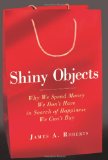
Why We Spend Money We Don't Have in Search of Happiness We Can't Buy
Review posted December 19, 2012.
HarperOne, 2011. 353 pages.
Here's a timely look at materialism in America. The author says in his introduction:
We are a nation in love with shiny objects. Our homes, our cars, our offices, our purses, and that storage unit we hate to admit to are all overflowing with our precious belongings. Whether your personal weakness is shoes, cars, jewelry, cigars, or any other possession (vintage posters, books, and watches are my downfall), we Americans love our money.
When it comes to spending money, are you more of a tightwad or a spendthrift? . . . Given that we are a nation of consumers, you might be surprised to learn that the majority of Americans would be classified as tightwads. With a high percentage of people living from paycheck to paycheck, how can consumerism be so rampant? It all boils down to how we pay for our purchases and the "pain of paying" associated with each payment method -- it's not that tightwads don't want to spend money, they just don't want to feel like they're spending money. We are a nation addicted to plastic. Using credit cards greatly reduces the pain associated with paying for our purchases -- so much so, in fact, that credit cards have earned the nickname "spending facilitators" by those of us who do research in this area. When we use credit cards, we make quicker purchase decisions, are more likely to buy, and are willing to pay more. . . .
As a professor at Baylor University, I have spent over twenty years conducting research with thousands of consumers from all walks of life on the related areas of materialism, credit card use, and compulsive buying. Why, in a land of plenty, do Americans want more? And why is more never enough? Given that most Americans would readily admit that money and material possessions are not going to make us happy, why do we continue to act as if they will? This book is the culmination of my efforts and those of other researchers to answer such questions. And though consumers are inscrutable, we have begun to unlock some of the mysteries behind materialism and its impact on our lives.
That gives you the idea. This book looks at studies done on consumer behavior and attitudes toward money. And it also attempts to teach the reader and gives tips for getting your actual behavior more in line with the things that matter most to you -- which usually, bottom line, is not money. This book is both interesting and helpful.
